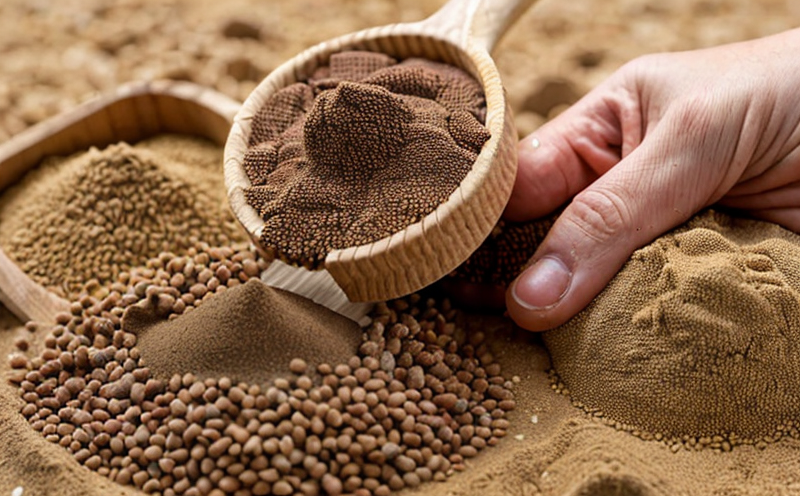Moisture Content Testing in Animal Feed
The moisture content of animal feed is a critical parameter that significantly impacts its quality and safety. Excessive moisture can lead to mold growth, nutrient degradation, and increased risk of contamination, which are detrimental to both the feed's effectiveness and the health of the animals consuming it.
Our laboratory specializes in providing comprehensive moisture content testing services for animal feeds using state-of-the-art equipment and internationally recognized standards like ISO 12373-1:2015. This test is pivotal not only for ensuring product quality but also for maintaining regulatory compliance across various jurisdictions such as the EU, USA, and China.
The process involves meticulous sample preparation to ensure accurate moisture determination. Samples are weighed accurately before drying at a specified temperature (usually 103°C ± 2°C) until a constant weight is achieved. The difference between the initial and final weights provides the moisture content percentage of the feed.
This test plays a crucial role in quality control, helping manufacturers to maintain consistent product specifications. It also aids in identifying potential issues early on, thereby minimizing waste and ensuring better overall efficiency. Compliance with such tests ensures that products meet consumer expectations for safety and efficacy.
Understanding the importance of moisture content testing is essential for various stakeholders including feed producers, importers, and distributors. For these entities, accurate results can translate into improved product quality, enhanced reputation, and increased customer satisfaction. Additionally, it supports sustainable practices by reducing losses due to spoilage or contamination.
In summary, moisture content testing in animal feeds is not just about meeting regulatory requirements; it's about ensuring optimal performance and safety of the final product. By leveraging advanced analytical techniques and adhering strictly to established protocols, our laboratory ensures reliable and precise results that meet international standards.
Why Choose This Test
Selecting moisture content testing for your animal feed is a strategic decision with far-reaching benefits. Firstly, it enhances the overall quality of the product by ensuring consistent moisture levels which are essential for maintaining nutritional value and preventing spoilage. Secondly, it supports compliance with international standards such as ISO 12373-1:2015, thereby safeguarding your brand reputation.
Moreover, regular testing helps in identifying potential issues related to mold growth or contamination at an early stage, allowing for timely corrective actions. This proactive approach can significantly reduce the risk of recalls and associated costs. Furthermore, it contributes positively towards sustainability by minimizing waste through precise moisture management.
For quality managers and compliance officers, this test offers peace of mind knowing that they are meeting stringent industry standards while maintaining high-quality products. R&D engineers can use these results to refine their formulations further optimizing the nutritional profile without compromising on safety.
Lastly, choosing our laboratory means you gain access to experienced professionals equipped with cutting-edge technology and methodologies. Our commitment to delivering accurate, reliable data aligns perfectly with your goals of excellence in animal feed production.
Customer Impact and Satisfaction
The impact of moisture content testing on customer satisfaction is profound. By ensuring that the product meets or exceeds quality expectations, we help build trust between producers and consumers. This trust translates into increased loyalty and repeat business—a win-win scenario for all parties involved.
Customers appreciate transparency regarding the safety and efficacy of the products they purchase. When they see consistent results from independent labs like ours, it reinforces their confidence in choosing our clients' brands over competitors'. Such positive feedback loops contribute to long-term relationships based on mutual respect and shared values.
In terms of operational efficiency, accurate moisture content testing enables better inventory management by predicting shelf life more accurately. This leads to reduced spoilage rates and lower waste levels, ultimately driving cost savings for both producers and retailers alike.
From an ethical standpoint, these tests reflect our dedication to providing safe and nutritious foodstuffs. By adhering strictly to global standards like ISO 12373-1:2015, we uphold the highest level of integrity in our business practices. This commitment resonates with conscientious consumers who prioritize responsible consumption patterns.
Ultimately, by investing in moisture content testing services offered by our laboratory, customers enjoy not only superior product quality but also enhanced brand loyalty and positive environmental impact.
Environmental and Sustainability Contributions
The importance of moisture content testing extends beyond mere compliance; it contributes positively to environmental sustainability efforts. Reducing waste through precise moisture management helps minimize the carbon footprint associated with manufacturing processes. By preventing mold growth and spoilage, we contribute towards more efficient resource utilization.
For feed producers, this translates into reduced energy consumption during production cycles since less raw material is wasted due to improper storage conditions. This efficiency gain supports broader sustainability goals by optimizing supply chains and reducing greenhouse gas emissions associated with transportation activities.
The use of advanced analytical techniques also minimizes the need for excessive chemical treatments aimed at preserving feed quality. Instead, we promote natural preservation methods that align well with eco-friendly practices advocated globally. In doing so, we support healthier ecosystems while fostering responsible consumption behaviors among end-users.
Moreover, by maintaining optimal moisture levels throughout distribution channels, our services help prolong the shelf life of animal feeds. This extended usability period reduces unnecessary replacements and encourages more sustainable purchasing habits among consumers.
In conclusion, moisture content testing plays an integral role in promoting environmental stewardship within the agricultural sector. Through rigorous quality assurance measures, we contribute meaningfully towards achieving global sustainability objectives while delivering tangible benefits to our clients' businesses.





